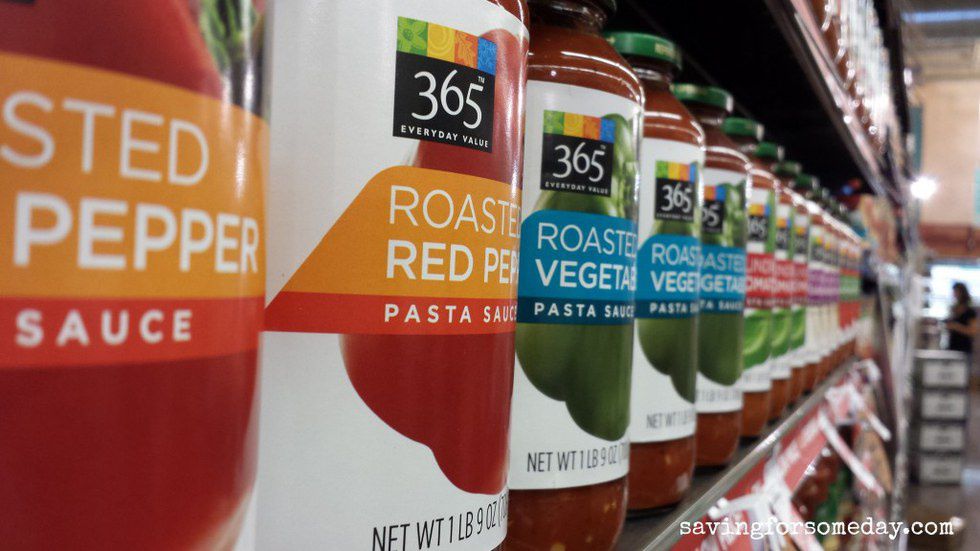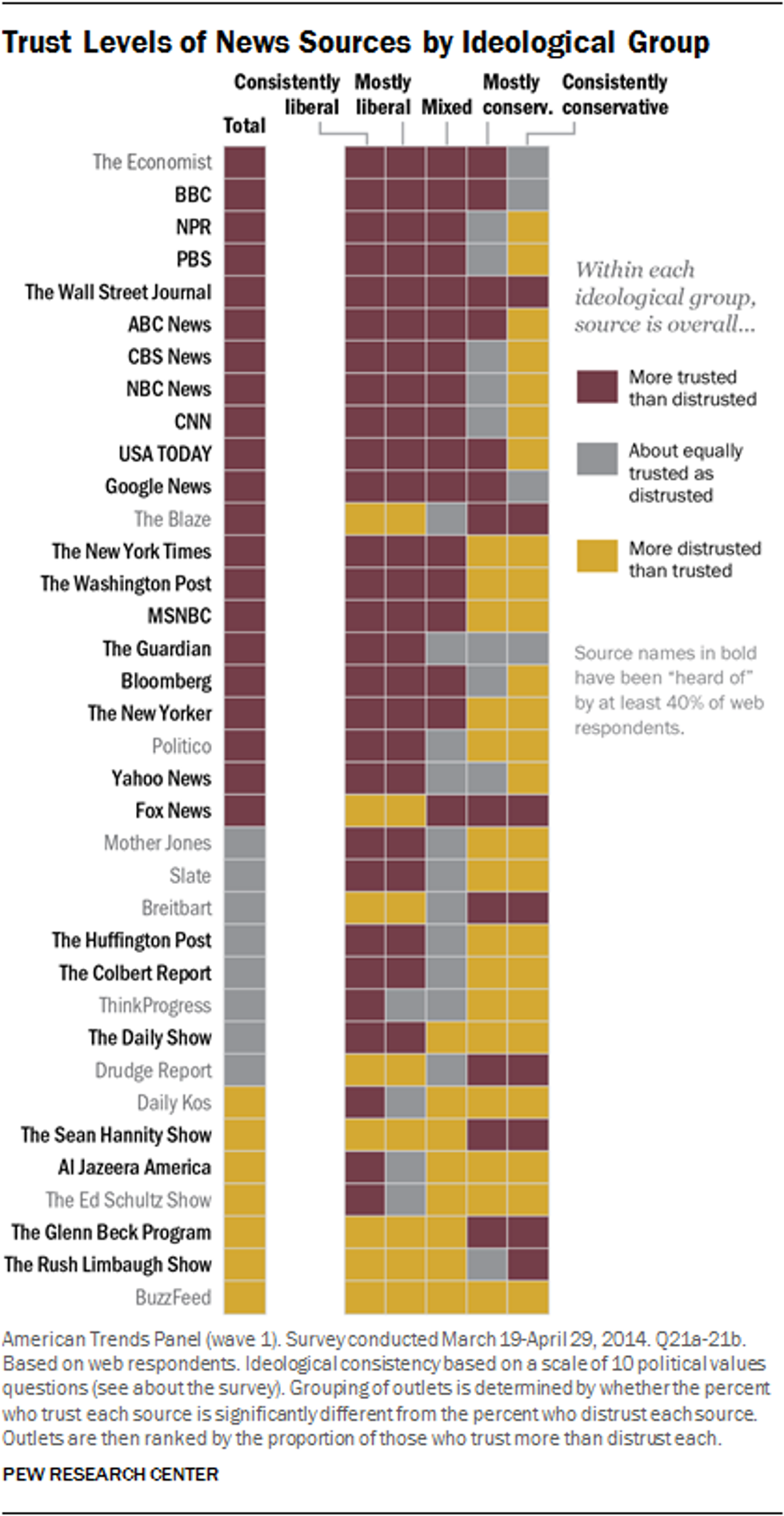Have you ever walked into the pasta aisle at Whole Foods? If you have, you understand the overwhelming experience of picking out a jar of pasta sauce. Don’t get me wrong– I love having options, especially when it comes to pasta sauce. Usually I go for classic, but sometimes I’ll change it up and buy one that is specifically tomato and basil, or garlic-based, or no sugar added. Sometimes I feel guilty buying anything in a grocery store that costs over $4.99, especially if it’s sauce. I’m indecisive enough as it is, even when I know what I like; even with a shopping list, so it’s no help when my local grocery store offers literally (okay, maybe not literally) 3,000 different kinds of pasta sauce to choose from. I feel the same way about contemporary media.
Recently, I’ve been trying to get my hands on accurate news sources. I don't know about you guys, but I enjoy having proven information at my fingertips when it comes to discussions about political, social and even religious discussions. I keep reading and hearing stories that are presented without enough research because all these news channels and websites are trying to tell/ share jaw-dropping headlines before their competitors. Unfortunately, I get a lot of quick (and probably inaccurate) news stories from Facebook because my friends share 30-second long videos explaining everything from plot twists in the presidential campaign to recent terrorist attacks to famous Vine stars complaining about social and political issues. But I can't stop watching them because they're so easily accessible. If you ever follow CNN, Fox, ABC, or NBC on social media, you will realize how quickly they post stories, one after the other, without precise information, just so they can get the headline out to the public. Often times, facts and numbers change over the course of finding out new information, which means false information is often put out before the truth. Not only that, but videos from popular news shows online are often cut and edited to reveal only specific parts of a debate or discussion. To clarify, I’m not blaming the people who work for these companies or the people who share their stories without realizing how inaccurate they are. I’m blaming our sudden need for rapid information all the time; the news wasn’t always like this.
Every morning at work, we put out newspapers. We get daily (or every-other-daily) copies of “The New York Times,” “The Wall Street Journal,” “The Boston Globe,” “USA Today," and a local paper. Despite this rather large collection of different papers, they usually all have the same cover story because of how rapidly news is spread. Maybe it’s a good thing that we’re all being given the same information, but it makes me wonder how much of that information is accurate and who I should trust when it comes to both global and local news.
When I typed “most unbiased news sources” into my Google search bar, the first link was an article from “Business Insider” titled, “Here and the Most- and Least-Trusted News outlets in America.” There are 36 different news outlets listed in the article, ranging from “The Economist” to “Buzzfeed” and how they are ranked “more trusted than distrusted,” “about equally trusted as distrusted,” and “more distrusted than trusted” for the following categories: consistently liberal, mostly liberal, mixed, mostly conservative and consistently conservative. The introduction states, “CNN and ABC might have the biggest audiences, but they’re not the most trusted across-the-board in America...BBC and The Economist top the list of outlets that are trusted by every ideological group, while BuzzFeed and The Rush Limbaugh Show are at the bottom.” But how do you decide on one source when you are still trying to figure out whether or not you define yourself as one of the five categories of people listed in this article? Do you start in the middle with the most neutral outlet?
And it’s not just choosing a news source that overwhelms me; it’s the amount of social media profiles I need to create to keep up with changing times. Yesterday, my friend Jacqueline, who is hardly older than me and already has 1) a lifestyle blog popular enough that she gets free merch in the mail and 2) plans to open her own spin studio in Boston, helped me create a LinkedIn account (this was after she helped me fix my class schedule for next semester because I accidentally signed up for, and I quote, “The hardest class [my school] offers” because I thought I needed a credit I actually don’t need). Anyway, now I have a “profile” on the following websites: Facebook, The Odyssey, LinkedIn, Instagram, Tumblr, Pinterest, Blogspot, Youtube, Spotify, Snapchat, Etsy, Yelp, and a bunch of others that require an account even though they aren’t really considered “social media.” I have yet to create a Twitter (after deleting it the first time), but I know I’ll need one soon enough if I ever want to have a successful career in either or both writing and visual art. Social media is necessary for people who are constantly connected to it, trying to get their name out. It is inescapable.
I’m sure this is probably the same thing people used to feel back in the old days when they walked into a library thinking, “How do I know which book to read?” when Goodreads reviews weren’t available at their fingertips. The thing is, I still get that feeling when I walk into a library. There are so many books I have yet to read, so many things I have yet to see, so many people I have yet to meet...but I feel like media is getting in the way of everything I want to do while I’m separated from my phone and computer screen.
Is it a bad thing to be connected to social media? Well, in a recent "Hidden Brain: NPR" podcast episode titled "Researchers Study the Effects of Social Media on Young minds," social science correspondent Shankar Vedantam says it all depends on the way you look at it. Vedantam says, "Researchers took teenagers, stuck them in the brain scanner and observed them as they engaged with social media. Lauren Sherman - she's a researcher at UCLA - she told me that she and her colleagues wanted to analyze the effects that social media has on young minds." Sherman says she and her team noticed a correlation between "quantifiable interaction" through social media and positive effects on the "reward center," or nucleus accumbens, of the brain. The researchers presented these teens with an Instagram feed and changed the amount of likes on not only the subjects' pictures, but on their friends' pictures, as well. When researches asked the subjects which pictures they preferred, the majority said they almost always preferred pictures with a higher amount of likes than pictures with a lower amount of likes. This happened both for their own pictures as well as their friends'. So, I guess it does depend on how you look at it, but it upsets me to think we subconsciously lose our own sense of self and what we like based off numbers on social media.
At the same time, I also feel like I need to keep up with it in order to be at least somewhat successful in fields that involve any kind of writing, politics, business management, art/ self promotion, etc. My hope is that someday there will be a grocery store that has already picked out the best of the best so I don’t have to spend an hour trying to decide what kind of pasta sauce I should buy. I guess I could make my own, too. My other hope is that I will someday be able to tell which websites I can trust for information, and that keeping up with all these media outlets will be worth it.

























